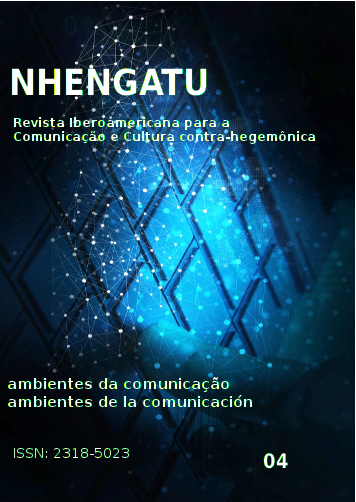THE NOOSPHERE AS A CULTURE FILE: THE ANALOGIC CULTURAL REVIEW COEXISTING WITH THE DIGITAL LOGIC IN COMMUNICATION
DOI:
https://doi.org/10.23925/nhengatu.v0i4.39270Keywords:
Noosphere, Comunication, Informatization, Transformation, Linkages.Abstract
This article is about noosphere, immaterial file culture, and the information technology as a potential transformer in the logic of this system. The interpersonal communication is the leitmotiv in the formation of the consisting and constituent culture of endogenous and exogenous images in the linear and/or analog thinking. It is observed in the internal, interpersonal, written or entered language a structural feature to the thought, society and culture, offering direction to the links. The imaginative products of this system would inhabit the noosphere constituting an immaterial file of humanity, being present in both the universal intentionality as well as in one of its corollaries: the digital communication network. It is inferred that the information to be derived from the analogical thinking breaks out as a potentiality of a noosphere that is previous to the binary logic, or dependent hierarchically. The question is about the inherent transformations of this system and its connections when one of its elements adopts relative autonomy in the production of meaning, breaking the boundaries between the threshold and its predecessor. The criticism is about the deconstruction of an ancestral system - the noosphere by analogical thinking – in favor of computerized summaries that are more effective in communication mediation.
References
ALTHUSSER, Louis. Aparelhos Ideológicos do estado. Nota sobre os aparelhos ideológicos do Estado, Gaal, 1983.
BAITELLO Jr., Norval. A era da iconofagia: ensaios de comunicação e cultura. Hacker Editores, 2005.
______________. A era da Iconofagia. Hacker Editores, 2006.
______________. A Mídia antes da máquina. JB Online, Caderno idéias, 1999.
______________. O animal que parou os relógios. Editora Annablume, 2009.
BARBERO, Jesus Martín. Dos meios as mediações: Comunicação cultura e hegemonia. Editora UFRJ, 2009.
BARBROOK, Richard. Futuros imaginários: das máquinas pensantes à aldeia global. Editora Peirópolis, 2009.
BAUDRILLARD, Jean. Simulação e Simulacro. Editora Relógio d’agua, 1981.
BAUMAN, Zygmunt. Comunidade: a busca por segurança no mundo atual. Rio de Janeiro, Jorge Zahar Editor, 2003.
BENJAMIN, Walter. A Obra de Arte na Era de sua Reprodutividade Técnica. Brasiliense, 1994.
_______________. Documentos de Cultura, Documentos de Barbárie. Editora Cultrix, 1986.
_______________. Magia e Técnica, Arte e Política: Ensaios sobre literatura e história da cultura. Editora Brasiliense, 1996.
CAZELOTO, Edilson. Inclusão Digital e a reprodução do capitalismo contemporâneo. PUC, 2007 (tese de doutorado).
CHARDIN, Teilhard de. O Fenômeno Humano. Editora Cultrix, 1995.
DEBORD, Guy. A Sociedade do Espetáculo. Ebooksbrasil, 2003.
DURKHEIM, Émile. A divisão do Trabalho Social. Martins Fontes, 2008.
ELIAS, Norbert. A Sociedade dos Indivíduos. Rio de Janeiro, Jorge Zahar Editor, 1994.
_______________. O Processo Civilizatório. Uma história dos costumes, Jorge Zahar Editor, 1990.
FLUSSER, Vilém. A Escrita: Há futuro para a escrita? Editora Annablume, 2010.
GIDDENS, Anthony. Modernidade e Identidade. Jorge Zahar, Editor, 2002.
________________. Modernização Reflexiva. Política, tradição e estética na ordem social moderna. Editora Unesp, 2012.
KUMMAR, Krishan. Da Sociedade pós-industrial à pós-moderna. Novas teorias sobre o mundo contemporâneo. Jorge Zahar Editor, 2006.
LYOTARD, Jean François. A Condição pós-moderna. José Olympio Editora, 2013.
MAFFESOLI, Michel. O tempo das tribos. O declínio do individualismo nas sociedades de massa. Forense Universitária, 2006.
MAUSS, Marcel. Sociologia e Antropologia. São Paulo, Cosac Naify, 2003.
MARX, Karl. O Capital – Conrad do Brasil, 2003.
______________. O Capital: crítica da Economia Política. Editora Nova Cultural Ltda, 1996.
MORIN, Edgar. Cabeça bem feita. Repensar a forma /reformar o pensamento. Bertrand Brasil, 1999.
______________.O método. A natureza na Natureza. Publicações Europa-América, 1977.
PINTO, Álvaro Vieira. O Conceito de Tecnologia. Contraponto Editora Ltda.,2005.
POULANTZAS, Nicos. As Classes Sociais no Capitalismo de Hoje. Zahar editores, 1975.
SIMMEL, Georg. Sociologia. São Paulo, Ática, 1983.
SODRÉ, Muniz. Antropológica do espelho: uma teoria da comunicação linear e em rede. Editora Vozes, 2010.
TRIVINHO, Eugênio. Dromocracia cibercultural. Editora Paulus, 2007.
______________. Glocal. Visibilidade mediática, imaginário bunker e existência em tempo real.
WIENER, Norbert. Cibernética e Sociedade. O uso humano dos sêres humanos, Editora Cultrix, 1968.
Downloads
Published
How to Cite
Issue
Section
License

This work is licensed under a Creative Commons Attribution-NonCommercial-ShareAlike 4.0 International License.
This license allows others to remix, adapt and create from your work for non-commercial purposes, and although new works must be credited to you and may not be used for commercial purposes, users do not have to license these derivative works under the same terms.


